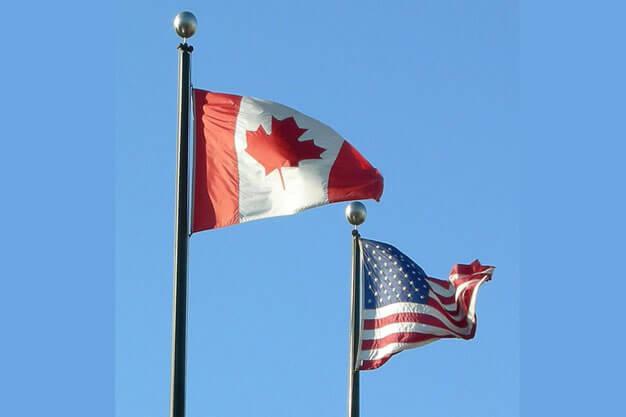May 2019
USA is one of the most prominent study destinations for prospective students. Due to the competitive nature of the country, along with the ample job opportunities and immense number of courses, students continue to travel to Study in USA.
Although a large number of prospective students travel to USA, some of them are still unaware of the characteristics of the education system there. The article looks to explore the levels of study, grading system, types of US colleges and universities and other relevant concepts.
Through the information attained in the article, one will have comprehensive understanding of not only the education system but also understand the courses in USA.
Although a large number of prospective students travel to USA, some of them are still unaware of the characteristics of the education system there. The article looks to explore the levels of study, grading system, types of US colleges and universities and other relevant concepts.
Through the information attained in the article, one will have comprehensive understanding of not only the education system but also understand the courses in USA.
Levels of Study
A student who has completed his schooling and looks to attain his first degree does it through the undergraduate program. The undergraduate program in USA typically takes four years to complete. Students decide the subject they want to major in and attain a degree in the same. The initial years are spent understanding basic subjects, however in the later years it changes to the area of specialization. Students often alter their area of majors through the course. The next level of study in USA is the postgraduate program. Upon attainment of an undergraduate degree, one becomes qualified to pursue a postgraduate degree. The courses in USA usually last for one to two years depending on the course of selection. Most undergraduate courses require one to give certain entrance exams such as the GRE, GMAT, to name a few. Lastly, after gaining a master’s degree one can pursue a doctorate. The duration of the course may range from three to five years. Having a doctorate is considered to be one of the most prestigious degrees ever.
Grading system for studying in USA
To an international student understanding the USA grading system can be an arduous task. However, it is quite simple to comprehend. Application in foreign universities requires one to submit their academic transcripts. Academic transcripts are a portrayal of your academic work and are showcased through grades. These grades can be shown in various formats, such as percentages or alphabetical grades. US colleges and universities have their own way of converting those grades. One must pay particular attention to the course requirements and understand how they analyze the grades. The reputation of your previous college will be a determining factor in how your grades are converted. The Grade Point Average system is followed in the United States to paint a picture of the student’s performance. Graded on a scale of 0 to 4, conversion is undertaken of percentage to GPA. A GPA of 0-1 is a D grade and is considered to be a failure. Furthermore, a 1-2 GPA is a C grade and is minimum passing. A GPA of 2-3 is a B grade and is considered to be satisfactory in nature. Lastly, a GPA within the range of 3-4 is an A grade and is equivalent to a high achievement.
Types of colleges in USA
There are three prominent types of US colleges and universities, firstly a private college. A private college is run by private individuals and is usually compact in nature but the tuition fees are higher. Many are of the firm belief that the quality of education provided there is higher, although that is still under contemplation. Secondly a state run college is run by the government and is highly reputed in nature. Every state has its own university which it manages. Many students prefer enrolling in state run universities due to the greater recognition it receives. Lastly, community colleges are those which offer a degree to their students in two years. Upon completion of the course at community college, students transfer themselves into other programs to attain a degree. Although the campus size of a community college is smaller, there exist no inefficiencies in providing the necessary infrastructural facilities to their students. Many students prefer studying in community colleges because the fees are lower without any comprise on the quality of education provided.
Benefits of Studying in USA
The number of higher education institutions in USA is greater than any other country, not only this but the quality of education offered in these universities is also impeccable. The faculties of these universities are professionals in their field of study and any student studying from them is considered to be extremely lucky. Not only are the taught programs great but even the research programs offered by these universities are world renowned. The student has ample avenues of universities or courses in USA through which a choice can be made. Financial assistance is also provided by the universities through loans and scholarships to enable students to study in USA which also acts as returns on investment. Although studying in USA is often considered to be an expensive affair, the global recognition that USA graduates holds make them highly sought after in the job market. USA is currently witnessing a technology boom thus studying in USA will enable the student to be a forerunner in the said field. Majority of the top ranking universities of the world are placed in USA. Studying in USA is not only flexible in nature due to the opportunity to transfer during the program but also because of the professional approach that the course structure there undertakes.
Admission Process for Studying in USA
The admission process for courses in USA is highly competitive in nature, with every department having its own entry requirements. One needs to plan in advance when considering to study in USA, organization and planning are two key skills that a student must possess. US universities have two intakes, a fall intake in August and September and a spring intake in January, February and March. The eligibility criteria for an undergraduate program are 10+2 years of education, while graduate programs require sixteen years of education. However, certain institutions accept three years of degree into their Master’s program. To study in USA one needs a strong academic background , good entrance test scores in exams like SAT,ACT,GRE,GMAT,TOEFL, IELTS and PTE to name a few. Strong recommendation letters along with Statement of Purpose, certificate of achievements and a sound financial background are requisites to study in USA.
Scholarships for Studying in USA Colleges and Universities
Ample scholarship opportunities are made available to the students. A student can study in USA however this can be made easier through availing scholarships. These scholarships are awarded to the students either on the basis of academic performance or on need based. Due to the competitive nature of scholarships in USA, one needs to adhere to the deadlines to make an application. The presentation of the application is of immense significance because the presentation is what attracts one to accept the application.
Expenses for studying in USA
Courses in USA can either be an undergraduate or postgraduate which can be studied at a public or private university. The tuition fees given below are calculated along the rates of $1= Rs 72. Tuition fees of public universities in USA for undergraduate programs could approximately cost between Rs 1080000 to Rs 1440000 per year. Furthermore, postgraduate courses could range from Rs 1080000 to Rs 1800000 per year. However, if a student chooses to study an undergraduate in a private college it could approximately cost one Rs 1440000 to Rs 2160000 per year. Moreover postgraduate courses could range between Rs 1440000 to Rs 2520000 per year. Apart from tuition fees living expenses also form a critical component of the cost structure when a student undertakes courses in USA. The location of the accommodation plays a critical role in the cost framework. If one lives in a metropolitan city the costs will be comparatively higher than those compared to living in a suburban area.
Work opportunities while studying in USA
Students are presented with the opportunity to work alongside their course. A student can undertake 20 hours of on campus jobs which includes a teaching or research assistantship, where one can expect to earn $8-$10. During the course break a student is allowed to work for 40 hours per week. The Optional Practical Training enables the student to study in USA one year after completion of the course, after which they can apply for a H1B visa for work permit. Students qualified in STEM degrees have an added advantage to work for three years upon completion of the course.
Accommodation in USA
US colleges and universities provide students with assistance when they’re seeking accommodation. Student accommodation can be of two kinds, either on or off campus. On campus accommodation are either residence halls or student hostels while, off campus include apartments or flats. Although off campus accommodations are cheaper in nature, students prefer to live on campus during the initial years, because it provides students with the opportunity to network with one another.
USA has been a forerunner in various fields such as telecom, health care and engineering to name a few. Being one of the strongest economies in the world, USA graduates hold key positions in areas of management, mathematics, computer engineering and the hospitality sector to name a few. Thus studying in USA will enable a graduate to make huge strides in their field of persuasion.
USA has been a forerunner in various fields such as telecom, health care and engineering to name a few. Being one of the strongest economies in the world, USA graduates hold key positions in areas of management, mathematics, computer engineering and the hospitality sector to name a few. Thus studying in USA will enable a graduate to make huge strides in their field of persuasion.
Student Testimonials:
The entire Edwise team was by my side giving me all the support and personal attention throughout my application process. Great job guys.
Name - Ojas Mithani
Country - USA
University - Long Island University
Name - Ojas Mithani
Country - USA
University - Long Island University
The counselors at Edwise were experienced and professional in their approach. They were approachable at any point of time whenever I needed them. They have been a life saver in times of great difficulties.
Name - Srivatsan Gopalakrishnan
Country - USA
University - North Eastern University
Name - Srivatsan Gopalakrishnan
Country - USA
University - North Eastern University
My experience with Edwise was fantastic. My counselor took care of all the things and was always there for me there. Everything was taken care with nothing to worry about.
Name - Ravin Seju
Country - USA
University - California State University, Fullerton
Name - Ravin Seju
Country - USA
University - California State University, Fullerton
It was very nice to get help from you all for my higher studies. Thanks a lot for the guidance. Studying abroad would not have been possible without Edwise.
Name - Anushrav Gulati
Country - USA
University - University of Illinois, Urbana Champaign
Name - Anushrav Gulati
Country - USA
University - University of Illinois, Urbana Champaign
Communication is the best at Edwise. They have massive information regarding the universities, the process of application and VISA application. It is the one stop shop for all your education woes.
Name - Shraddha Shinde
Country - USA
University - LIU Brooklyn
Name - Shraddha Shinde
Country - USA
University - LIU Brooklyn
Edwise Overseas Education Consultant
We at Edwise streamline and personalize the process for each student irrespective of the destination, institution, course or any level of study. Our team of experienced professionals will provide you individual attention and exceptional guidance throughout your process of application. We provide assistance related to course selections, admission, visa, bank-loan and scholarships. We also host University delegates for direct student interaction and all these services are provided free of cost. We have established since 1991 and have been maintaining strong networks with over 725 universities in 16 countries, hence giving us a unique insight into the finest educational establishments worldwide.
Start your education overseas with valuable information on everything you need to know about studying abroad from study permits, temporary resident visas and how much it costs, to finding the best suited program for you.
Start your education overseas with valuable information on everything you need to know about studying abroad from study permits, temporary resident visas and how much it costs, to finding the best suited program for you.












